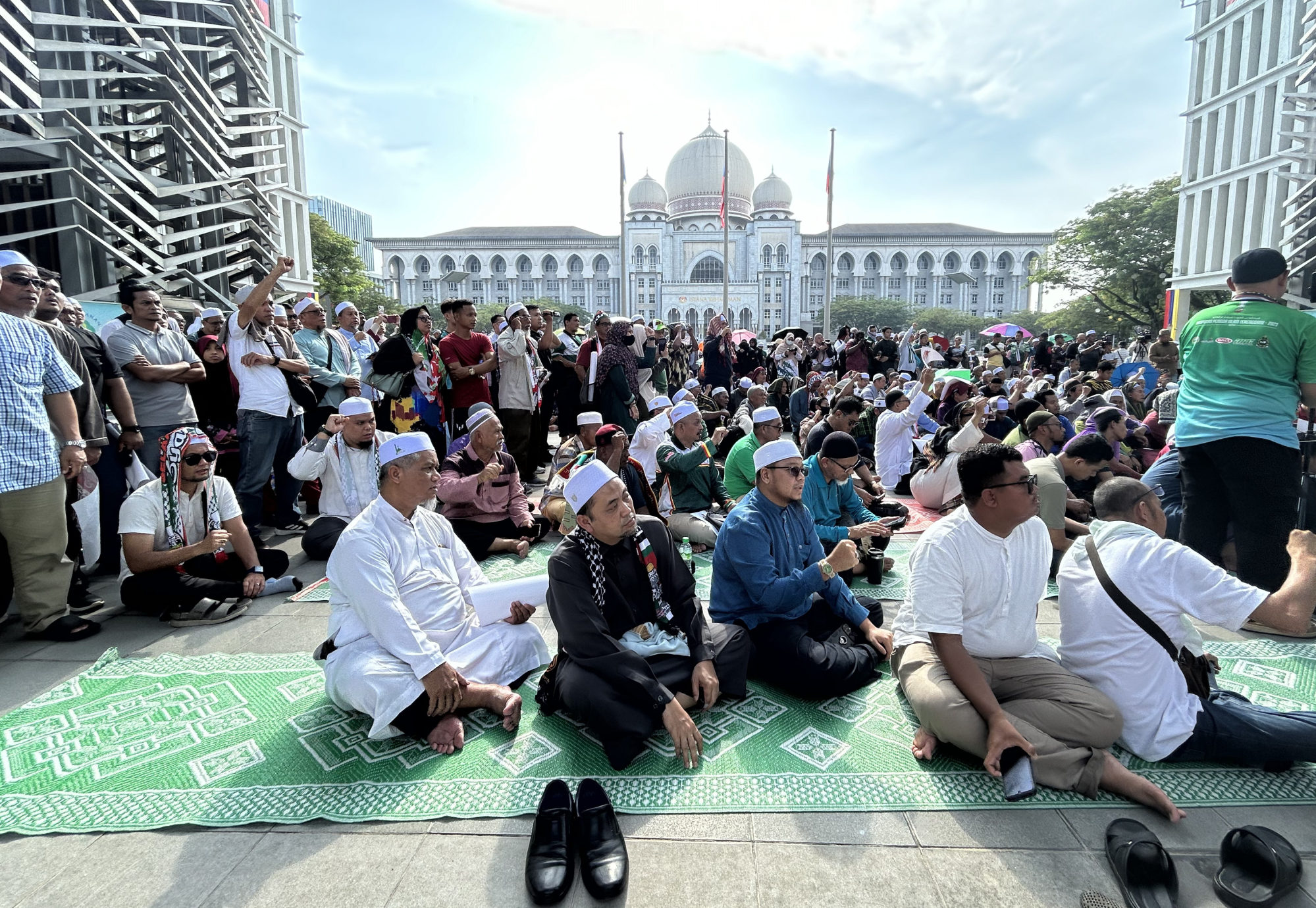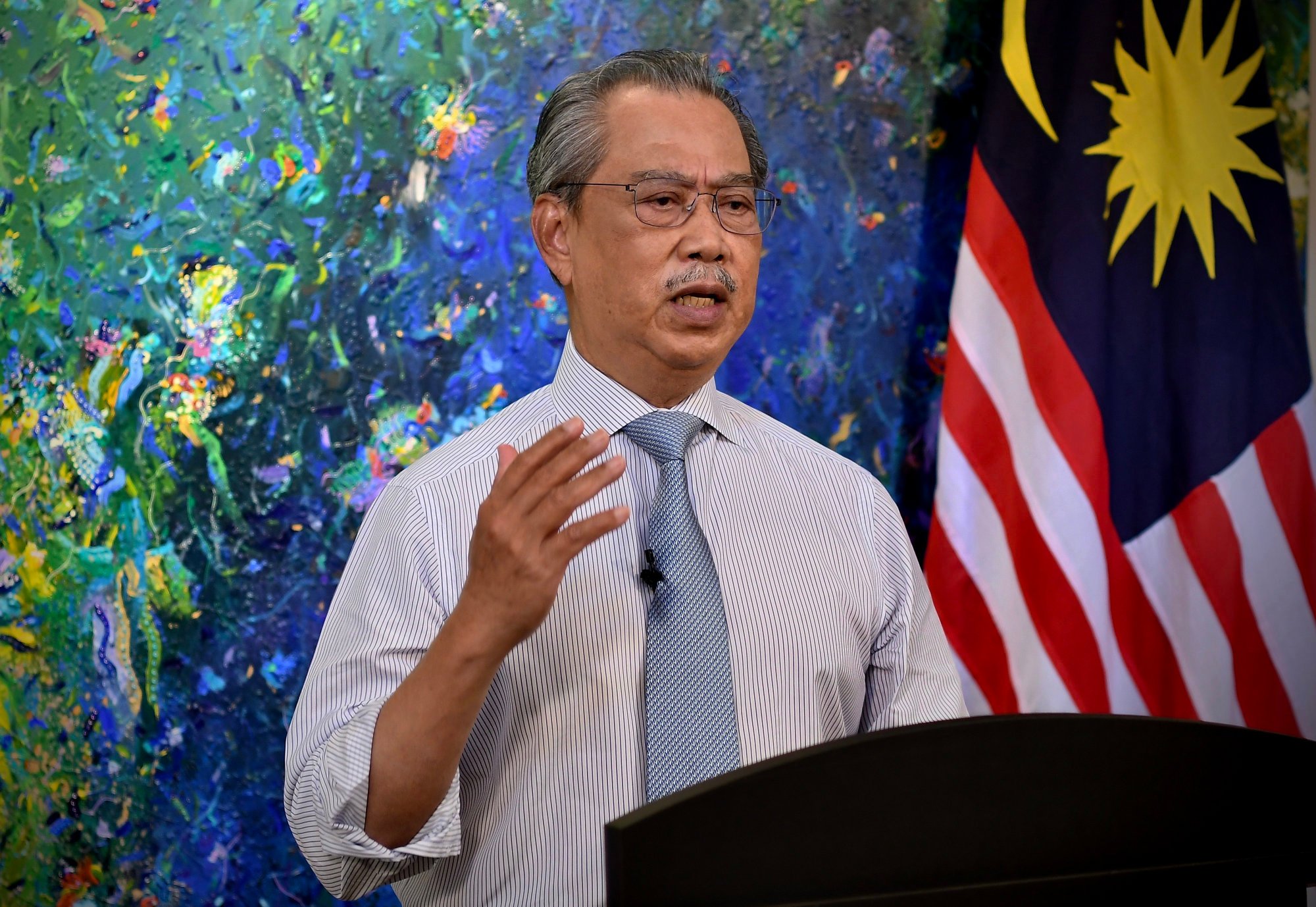SCMP:
What Kelantan’s upended sharia push in Malaysia reveals about PAS’ Islamist politicking
PAS had two years to push their agenda to elevate sharia courts in Malaysia, but remained curiously silent while holding federal power
Now in opposition, they are blaming PM Anwar for the failure of Kelantan’s sharia push as a ploy to rally their base
My Take
by Joseph Sipalan

Published: 11:00am, 16 Feb, 2024
Around a thousand Malaysians last Friday expressed outrage and shed tears as they gathered outside the country’s federal court, at a rally organised by Kelantan leaders ahead of a landmark ruling that rendered the state’s expansion of sharia law unconstitutional.
It was the usual spectacle associated with demonstrations organised by Parti Islam Se-Malaysia (PAS) – especially ones that involve the Islamist party’s policies.
Their supporters vehemently decried attempts to undo what the state leaders had achieved, saying the moves were un-Islamic and defied Allah.

My Take
by Joseph Sipalan

Published: 11:00am, 16 Feb, 2024
Around a thousand Malaysians last Friday expressed outrage and shed tears as they gathered outside the country’s federal court, at a rally organised by Kelantan leaders ahead of a landmark ruling that rendered the state’s expansion of sharia law unconstitutional.
It was the usual spectacle associated with demonstrations organised by Parti Islam Se-Malaysia (PAS) – especially ones that involve the Islamist party’s policies.
Their supporters vehemently decried attempts to undo what the state leaders had achieved, saying the moves were un-Islamic and defied Allah.

Members of PAS await the Federal Court’s decision on Kelantan state’s sharia law criminal enactment on February 9. Photo: AP
The drama surrounded a constitutional review filed in early 2022 by a Muslim lawyer and her daughter, months after the PAS-dominated Kelantan state assembly passed amendments to the state’s sharia criminal enactment that broadened its scope to include more than a dozen crimes as punishable under Islamic law.
Those crimes included incest, bestiality and the offering of sexual services, all of which already come under similar provisions under civil law – and with harsher punishments.
The federal court ruled as widely expected, albeit on an 8-1 majority, that Kelantan’s assembly had overstepped its bounds by attempting to enact laws that fall squarely under federal jurisdiction.
Malaysian Chief Justice Tengku Maimun Tuan Mat, who was born and bred in Kelantan, anticipated there would be a backlash against the decision.
The country’s top judge prefaced the ruling by stating clearly that the case was an examination of constitutional limitations and had “nothing to do with the position of Islam” or that of the country’s sharia courts.
She repeated what she had said in November, when the federal court last met to hear the case before last week’s judgment, but clearly no one in the conservative political camp had bothered to take notice.
Former prime minister Muhyiddin Yassin, who heads the Malay nationalist Perikatan Nasional (PN) opposition coalition, said in a statement that the apex court’s ruling meant Muslims in Kelantan would now not face any punishment for committing any of the acts that were prescribed under the invalidated amendments.
He made this erroneous comment, despite knowing full well that civil laws governing said crimes remain in place and are enforced by police in Malaysia, including in Kelantan.

The drama surrounded a constitutional review filed in early 2022 by a Muslim lawyer and her daughter, months after the PAS-dominated Kelantan state assembly passed amendments to the state’s sharia criminal enactment that broadened its scope to include more than a dozen crimes as punishable under Islamic law.
Those crimes included incest, bestiality and the offering of sexual services, all of which already come under similar provisions under civil law – and with harsher punishments.
The federal court ruled as widely expected, albeit on an 8-1 majority, that Kelantan’s assembly had overstepped its bounds by attempting to enact laws that fall squarely under federal jurisdiction.
Malaysian Chief Justice Tengku Maimun Tuan Mat, who was born and bred in Kelantan, anticipated there would be a backlash against the decision.
The country’s top judge prefaced the ruling by stating clearly that the case was an examination of constitutional limitations and had “nothing to do with the position of Islam” or that of the country’s sharia courts.
She repeated what she had said in November, when the federal court last met to hear the case before last week’s judgment, but clearly no one in the conservative political camp had bothered to take notice.
Former prime minister Muhyiddin Yassin, who heads the Malay nationalist Perikatan Nasional (PN) opposition coalition, said in a statement that the apex court’s ruling meant Muslims in Kelantan would now not face any punishment for committing any of the acts that were prescribed under the invalidated amendments.
He made this erroneous comment, despite knowing full well that civil laws governing said crimes remain in place and are enforced by police in Malaysia, including in Kelantan.

Former Malaysian Prime Minister Muhyiddin Yassin. Photo: Bernama/dpa
So what gives?
To make sense of all this, we must first look at Malaysia’s unique dual legal system. The country, for the most part, is governed by civil law while sharia law is a parallel system that deals with family matters such as inheritance, deaths and marriages for the Malay-Muslim majority.
PAS, a key member of the PN coalition, has for years attempted to elevate the status and powers of the sharia courts to issues beyond housekeeping. In fact, its party constitution states that its ultimate goal is to establish a theocratic Islamic State in Malaysia.
It is a controversial position for multiracial and multi-religious Malaysia. The last significant push was made in 2016 when PAS president Abdul Hadi Awang filed a private member’s bill in parliament seeking to elevate the status of the country’s sharia courts.
Nothing came of it, but PAS had the opportunity to push forward with its Islamist agenda when it joined Muhyiddin’s rise to power after a mess of a political coup in 2020. Though they were in office for two years, there was not a single mention of the plan.
PAS now says that Prime Minister Anwar Ibrahim’s administration should take responsibility and use his two-thirds parliamentary majority to enable greater powers under sharia law, referring to the threshold needed to amend the federal constitution.
Because putting the blame on someone in power is a tried-and-tested way for a party to rally its base while covering up for its perceived shortcomings.
Every single political party in Malaysia has been guilty of that, and they continue doing it because voters let them get away with it.
While many argue that Malaysia’s democracy is still young and evolving, it wouldn’t hurt for voters to be a little bit more sceptical of their so-called leaders.
So what gives?
To make sense of all this, we must first look at Malaysia’s unique dual legal system. The country, for the most part, is governed by civil law while sharia law is a parallel system that deals with family matters such as inheritance, deaths and marriages for the Malay-Muslim majority.
PAS, a key member of the PN coalition, has for years attempted to elevate the status and powers of the sharia courts to issues beyond housekeeping. In fact, its party constitution states that its ultimate goal is to establish a theocratic Islamic State in Malaysia.
It is a controversial position for multiracial and multi-religious Malaysia. The last significant push was made in 2016 when PAS president Abdul Hadi Awang filed a private member’s bill in parliament seeking to elevate the status of the country’s sharia courts.
Nothing came of it, but PAS had the opportunity to push forward with its Islamist agenda when it joined Muhyiddin’s rise to power after a mess of a political coup in 2020. Though they were in office for two years, there was not a single mention of the plan.
PAS now says that Prime Minister Anwar Ibrahim’s administration should take responsibility and use his two-thirds parliamentary majority to enable greater powers under sharia law, referring to the threshold needed to amend the federal constitution.
Because putting the blame on someone in power is a tried-and-tested way for a party to rally its base while covering up for its perceived shortcomings.
Every single political party in Malaysia has been guilty of that, and they continue doing it because voters let them get away with it.
While many argue that Malaysia’s democracy is still young and evolving, it wouldn’t hurt for voters to be a little bit more sceptical of their so-called leaders.
PAS win-win all the way with the Sharia enactments and the fallout from the Federal Court ruling.
ReplyDeleteFirst they already milk the credit from years ago when they were first to incorporate Criminal penalties into the Syariah enactments.
Then when the Federal Court declared the Sharia amendments unconstitutional, they gain opportunity from painting themselves as "defenders of Islam" against the "Godless Liberal" Kafirs.